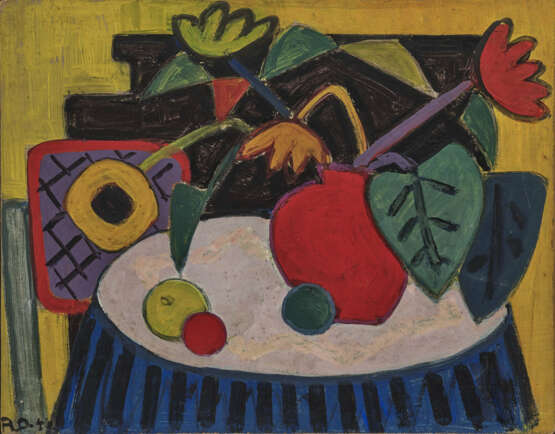ID 675677
Lot 515 | Rolf Diener
Estimate value
€ 1 500 – 2 000
1906 Gößnitz/Thüringen - 1991 in Hamburg
Blumenstillleben. 1946
Links unten monogrammiert und datiert. Öl auf auf Hartfaser. 33 x 41,5 cm. Rahmen. Der Deutsche Rolf Diener wurde am 29.03.1906 in Gößnitz, Thüringen, geboren. Vier Jahre später zog er nach Hamburg, wo er von 1927-1931 die Landeskunstschule Hamburg besuchte - sein Mentor war Arthur Illies. Der 2. Weltkrieg bedeutete ein kurzzeitiges Aus seines künstlerischen Schaffens, da er als Werkzeugmacher tätig war. Danach ging er wieder einer künstlerischen Betätigung nach und studierte von 1948-1951 am Baukreis, einer Künstlervereinigung der Nachkriegszeit, in Hamburg unter Arnold Fiedler. Diener setzte sich mit verschiedensten Strömungen der Klassischen Moderne auseinander, bevor er sich der Abstrakten Malerei zuwendete. Diese Form der Malerei vollzieht einen Bruch mit den Grundprinzipien der abendländischen Malerei. Sie ist nicht gegenständlich - sondern im Gegensatz dazu ist sie über das Komponieren mit Farben, Linien und geometrischen Formen, losgelöst von Darstellungen und nicht-gegenständlich. Charakteristische Motive des deutschen Künstlers sind Darstellungen von Häfen, abstrakte Kompositionen sowie Stillleben. Diese Motive greift Diener in verschiedenen Schaffensphasen immer wieder auf, wodurch man anhand der einzelnen Werkgruppen eine Wandlung von der gegenständlichen zur abstrakten Malerei nachvollziehen kann. Literatur: Heydorn, Volker Detlef, Maler in Hamburg. Bd. 1-3, Hamburg 1974. Seupher, Michael, Knaurs Lexikon Abstrakter Malerei. München 1957. Burmeister, Ronald, Rolf Diener vergessener abstrakter Maler in Hamburg. Hamburg 1974 (als Manuskript veröffentlicht)
| Auction house category: | Paintings Classic Modern |
|---|
| Auction house category: | Paintings Classic Modern |
|---|
| Address of auction |
Kunstauktionshaus Neumeister Barer Str. 37 80799 München Germany | ||||||||||||||
|---|---|---|---|---|---|---|---|---|---|---|---|---|---|---|---|
| Preview |
| ||||||||||||||
| Phone | 089 231710-20 | ||||||||||||||
| Fax | 089 231710-50 | ||||||||||||||
| Buyer Premium | 30% | ||||||||||||||
| Conditions of purchase | Conditions of purchase | ||||||||||||||
| Business hours | Business hours
|



